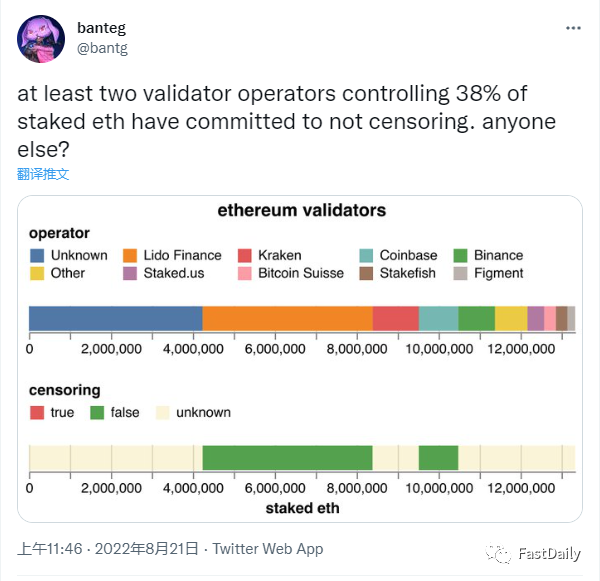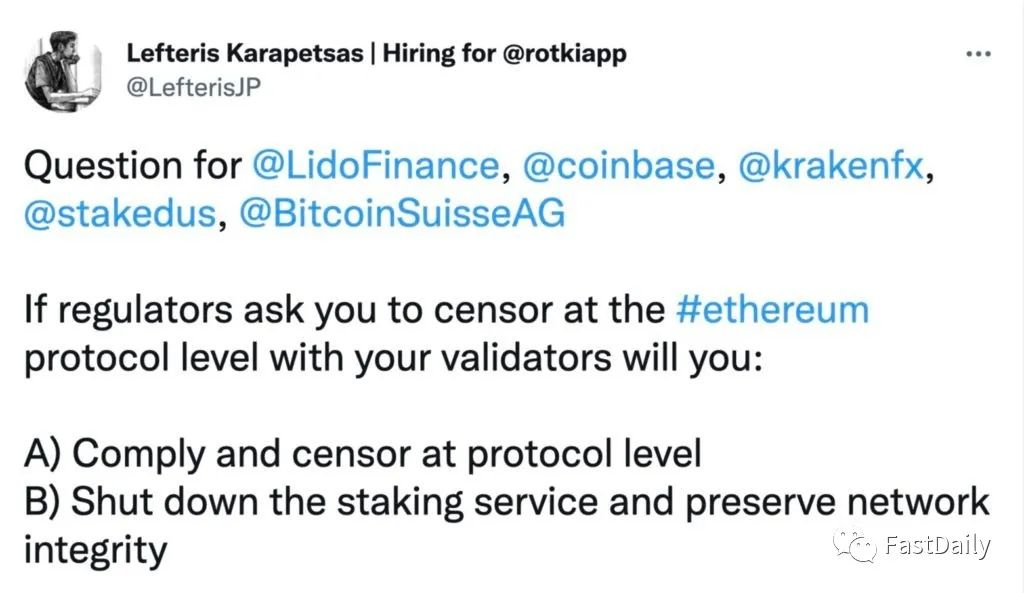Original translation: old yuppie
Original translation: old yuppie
From the initial Tornado sanctions incident and the major DeFi protocols that cooperated with US sanctions (blocking specific addresses at the front end), the current debate is, after the Ethereum PoS transformation, will the centralized pledge service finally start to review specific transactions? The community is also debating whether BTC, ETH, or Beacon Chain is more decentralized and censorship-resistant.

Banteg, the core developer of Yearn, shared the current verification distribution map of BTC, ETH, and Ethereum beacon chains on Twitter. He analyzed,Lido and Coinbase, two major staking services (~38%), have pledged to fight censorship.
So what other validators, whether based on a DeFi protocol or an exchange like Kraken or Binance, can stand up to regulation?

The verification nodes of ETH2 are actually quite decentralized, and at the same time the encryption community pointed out several problems:
Lido plus Coinbase's share is 38%, which is too high.
DeFi veteran Degen Spartan believes Lido will own more than half of the market by 2024.
What is Lido's way of promising resistance to censorship?
Even if the ETH2 nodes are scattered, if they are subject to censorship in the future, all this will be in vain
first level title
Coinbase takes a stand
Brian Armstrong said,He would rather shut down the company’s Ethereum staking service than comply with government orders to review sanctioned transactions.
"It's a hypothesis we wish we didn't really confront. But if we had to choose, I think we'd choose B." Brian Armstrong tweeted in response to Rotki founder Lefteris Karapetsas, who asked whether Coinbase and its peers were affected by Pressure from regulators, whether they will review or get out of the staking business.
"One has to look at the big picture. There may be better options or a legal challenge that could help achieve a better outcome," Brian Armstrong continued.
first level title
aftermath of tornado
The sanctions imposed on Tornado Cash and the subsequent arrest of developers who contributed to its code have sparked an existential debate within the Ethereum community. Prominent members demanded that multi-billion dollar players like Coinbase take sides.

"You have a real job, and that's to resist censorship,"first level title
concentration of power
Four entities — Lido, Coinbase, Kraken, and Binance — control about 60% of the ETH staked to secure Ethereum’s beacon chain, a proof-of-work (PoW) chain that is similar to Ethereum’s current proof-of-work (PoS ) proof-of-stake consensus layer running in parallel. When the two merge — a long-awaited event, currently scheduled for mid-September — the beacon chain will effectively absorb the proof-of-work chain, reducing ethereum’s energy usage by more than 99%. But it would also give major interest entities the theoretical power to reject certain deals.
Karapetsas posed a question to Lido, Coinbase, and other major Ethereum 2.0 staking providers. If regulators asked them to review Ethereum transactions, how would they choose:
[A] Comply with regulatory agency requirements.
[B] Will get out of the staking business to "maintain network integrity" and incur billions in capital losses in the process?
"If any of them choose [A], we should actively work to keep them away, as they pose an existential threat to the permissionless nature of the web," Lane Rettig wrote in a subsequent tweet.
The question sparked a bitter, multifaceted debate - would regulators really do this? can they What will Lido, Coinbase, and other staking entities do? And, perhaps most importantly: if they do comply, how can the community fight back?
According to cryptocurrency lawyer Geoff Costeloe,Centralized staking entities have no choice but to comply with government censorship orders.
"These are not individuals. They are entities with shareholders and an obligation to make a profit," he tweeted. "It's only really a problem if [A] isn't more profitable than [B] (or similar)."
Luke Youngblood, a developer of DeFi protocol Moonwell involved in Coinbase's ETH staking service, disputed this claim.
first level title
review punishment
However, if Coinbase and the company do abide by the censorship rules, the ethereum community will have no choice but to opt for a “user-activated soft fork,” or USAF, according to the outlet.
According to Twitter personality and self-proclaimed Bitcoin developer Eric Wall, such a move would"The interest of eliminating any entity that systematically conducts censorship at the ground level to comply with government regulation"。
first level title
USDC Veto
Goldfinch co-founder Blake West believes that Circle, the issuer of the USDC stablecoin, effectively has a veto over Ethereum given its importance in the ecosystem. To illustrate his point, he cites some attempts to keep Ethereum's proof-of-work (PoW) chain alive after The Merge.
Miners, the operators who today contribute vast amounts of computing power to securing Ethereum, would find their expensive mining rigs useless after merging, and commit to "forking" the network -- in other words, copying and pasting what currently exists. Ethereum Square and continue to operate it as if nothing has changed.
West believes that such efforts will prove futile.
“When the [proof-of-work] fork goes live, the supply of USDC will instantly double — at least on-chain,” he wrote. “Of course the dollar backing in Circle’s bank account won’t. So Circle had to choose one and only one chain. They chose the proof-of-stake (PoS) chain. That alone killed the PoW fork. BecauseIf the USDC value dropped to zero immediately, the state of the chain would become chaotic.”
Blockworks research analyst Matt Fiebach believes this could trigger anti-censorship from the US Air Force.
“Will Circle (USDC) support a censored or uncensored chain?” he mused on Twitter. “If they (could) opt for a review chain, then we could be screwed by actors who support a permissionless vision.”
Original link